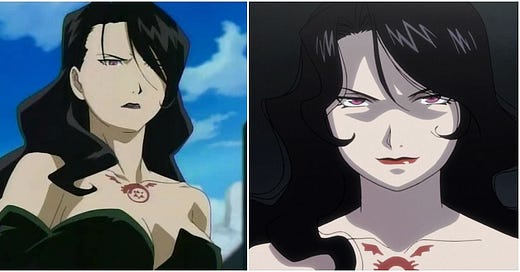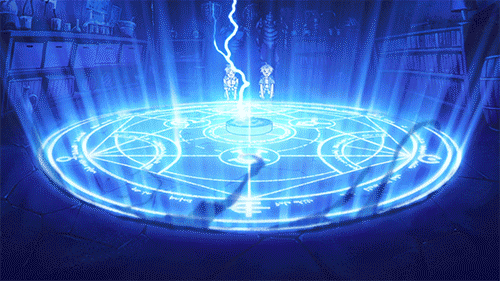TL;DR: classic, must watch.
Synopsis: two brothers lose parts of their bodies when they try to resurrect their mother using magical alchemy and go on a journey to retrieve their bodies.
Fullmetal Alchemist (FMA03) was originally released in 2003 and caught up to the manga while it was still airing, so the producers opted for an anime original story which went surprisingly well. On myanimelist, the top 8 most upvoted reviews on the site are all endorsements, and only 4 of the 244 reviews on the website did not recommend it.
Later, a 2nd version called Fullmetal Alchemist: Brotherhood (FMAB) was released in 2009 and was marketed as the version that was faithful to the manga. It was even more highly rated, and only 37 of 982 reviews do not recommend it.
Believe it or not, testing the difference in the proportion of negative reviews between the two series yields a null p-value (p = .1).
The defining feature of the world is the power of alchemy, which allows people to convert materials to other materials based on the principle of equal exchange. This means that the matter that is converted must be equal in value/size, though the series is rather flexible with this criteria. This power requires the use of transmutation circles, which are occult-like symbols that are placed close to the transmuted material.
This ability can be used to fight in various ways: “earthbending”, making explosions, guns, swords, basically anything that you can think of. A great power system, enabling creativity and originality, but discouraging power creep, as all characters are bound by the system of equivalent exchange.
FMA also avoids other tropes that plauge the shounen genre: most of the cast is above the age of 18 and there is very little fanservice. It ends too.
The plot itself is a little unusual — two brothers lose parts of their bodies and search for a way to return themselves to their original state. The original largely sticks with this premise, while brotherhood spirals off into a more grand story evolving a larger villain.
It’s almost a waste of words to explicitly say ‘Fullmetal Alchemist is good’ — it is one of the most critically acclaimed anime in the world, it would be odd if it wasn’t. What is more interesting is whether one of the versions is definitively better than the other (spoilers beyond this point).
FMA03 is currently rated at a 8.11 (#460) on myanimelist, while FMAB is rated a 9.1 (#1) on myanimelist. Based on this, you would think that FMAB is the dominant favorite, but a minority of about 15% (seems kind of low to me, but perhaps they are a very vocal one) prefers the original.
Based on complex but correlated value theory of anime quality (anime preferences are subjective but these preferences have considerable overlap between people, leading to the existence of “objective” bad anime and good anime), you would assume brotherhood is the better version by default, as it is more highly rated. That’s a bit of a reach — the reviewers seem to show no strong preference based on the ratio of negative reviews to total reviews (if anything, they prefer the original) and there could be factors not related to quality that bias the overall preference towards one version.
The community has a canon-bias, that is, they automatically prefer anything that is faithful to the source material. This is a good social convention, as it keeps narcissistic directors and writers from thinking they can take a series that had success and fiddle with it. However, it is clearly unreasonable when actually evaluating quality of individual series, whether something is canon or not doesn’t actually affect the experience of watching the anime. Because of this, I think that FMAB has been unfairly overrated in comparison to the original.
I have rewatched both versions of the series as a teenager and once again as an adult about a month ago. As a teenager, I prefered the original, but when I rewatched them as an adult, I thought Brotherhood is better. I think this is because it has more rewatch value relative to the original; most of the initial emotional impact is drained away and the more complex and tightly written story ends up winning out.
Going through the differences in the details:
Design: this is a pretty good rundown of the differences in character art - overall I prefer the brotherhood designs slightly more. The animation in brotherhood great, though if I recall correctly, FMA03 still had reasonably good animation.
Scar: Scar’s story is much more nuanced in 03 than brotherhood. His change in motivations seemed more believable, as he wasn’t even “bad” in the original.
Lust: much better in 03. She was a fairly conventional villain in brotherhood, but 03 gave her a motivation and a real backstory.
Main villain: father is a very boring villain. “I am evil and want to take over the world”. How original. Dante isn’t much better, but at least she isn’t father.
Homonculi: in 03 they are caused by human transmutations, while in brotherhood they are just father’s pawns. The former is a much cooler mechanic, it makes the human transmutation taboo more reasonable, even if it made the actual story a little harder to write.
Filler: FMA03 has a lot of side stories that aren’t relevant to the main story, Brotherhood is also guilty of this, but to a much lesser extent.
Plot: FMAB is more complex and is more tighly written. The subplots also meaningfully tie into the main story.
Direction: FMAB’s story shifts towards the main villain, father, who seeks to take over the world. It made the anime more cliche, but added another layer of complexity to it. No clear winner here, in my opinion.
Beginning: it takes 10 episodes for Hughes to die in brotherhood, while it takes 25 for him to die in the original. In this case, it is brotherhood that was unnecessarily rushed, though I think a decent number of modern viewers might find Brotherhood’s pacing to be appropriate — probably why the anime has kept its prestige over the years.
Ending: FMAB has a conventional happy ending. FMA03 is bittersweet: the brothers end up split in both worlds and the rest of the world continues at it is. Thematically, 03 has a better ending, as the bittersweet ending suits the theme of equivalent exchange.
Focus: FMA03 focuses on the brothers while FMAB focuses on the world in general. Brotherhood is the winner here, as the greater scope also came with greater variety.
Pacing: FMAB has relatively fast pacing, while FMA03 has relatively slow pacing. Personally I prefered the pacing of 03, but both of them were paced pretty well overall (beyond the beginning of FMAB).
FMA03 wins 6-5, but I wouldn’t weigh all of these points equally. Having a more important plot is definitely more important than the development of a single character. When I calculated the subfactor scores for both, FMA03 got an 89 while FMAB got a 90, hardly a meaningful difference.
Personally, I think that both versions are roughly equal in quality, with the original being better on the initial watch, and brotherhood having more rewatch value.
FMA03 Scoring:
Design (12/15):
Distinguishment: (5/5) - iconic symbols/art
Animation: (1/2)
Sound: (1/2) - not notable
OST: (2/2) - classic
Character designs: (2/2)
Backgrounds: (1/2)
Script (45/50):
Character Investment: (10/10)
Character Realism: (2/2)
Character Complexity: (3/3)
Plot solidness: (4/5) - good writing, but has loose ends
Plot complexity: (8/10) - subplots don’t tie into the main plot
Ending: (5/5) - the superior ending
Pacing: (5/5) - seemed fine?
Stakes: (8/10) - lower as the stakes are mostly contrained to the main
Value (15/15):
Thematic elements: (5/5)
Skill: (5/5)
Originality: (5/5) - extremely popular, but never seen anything like it
Enjoyment (17/20):
Did I like it: (17/20)
____________________________________
FMAB Scoring:
Design (13/15):
Distinguishment: (5/5)
Animation: (2/2)
Sound: (1/2)
OST: (2/2)
Character designs: (2/2)
Backgrounds: (1/2)
Script (46/50):
Character Investment: (9/10) - cast was larger, but shallower.
Character Realism: (2/2)
Character Complexity: (3/3)
Plot solidness: (5/5)
Plot complexity: (10/10)
Ending: (4/5)
Pacing: (4/5) - a little too fast, especially in the beginning
Stakes: (9/10)
Value (14/15):
Thematic elements: (5/5)
Skill: (5/5)
Originality: (4/5)
Enjoyment (17/20):
Did I like it: (17/20)






